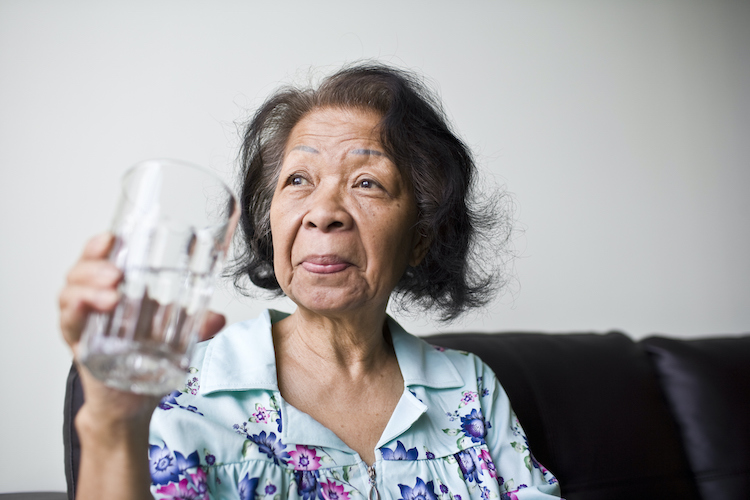
It’s important to know the signs of dehydration in older people.
During the warmest time of the year, maintaining proper hydration is a must, especially for seniors. In fact, close to half of all older adults are chronically under-hydrated, according to a recently available UCLA study, which can bring on many different health risks, such as kidney stones, urinary tract infection, and also an increased risk for falls.
The frequency of dehydration in seniors is attributed to a combination of factors, most notably:
- A decreased level of water naturally in aging bodies
- Medication side effects
- Less awareness of the sensation of thirst
- A decreased ability to maintain a proper fluid level balance in the body
- Diminished efficiency of the kidneys
- And much more
There is a simple calculation to identify the amount of water an older adult should drink each day. Take the individual’s body weight in pounds, and drink 1/3 that many ounces of water daily. Somebody who weighs 120 pounds, for instance, should drink no less than 40 ounces of water – about five 8-ounce glasses.
Time is of the essence in ensuring hydration in older adults, as it’s much simpler to improve mild dehydration before it gets to be more severe. Symptoms include:
Mild Dehydration:
- Decreased, darker-colored urine
- Dry mouth
- Dizziness and fatigue
- Muscle cramping
- Irritability
- Headaches
Severe Dehydration:
- Disorientation and confusion
- Difficulty with walking
- Faint, fast pulse
- Low blood pressure levels
- Worsening of muscle cramps
- Sunken, dry eyes
- Skin that is wrinkled and has lost elasticity
- Bloating
- Quickened breathing
- Convulsions
Obtain medical assistance promptly should you suspect dehydration in an older adult, in order to prevent serious health complications which might develop rapidly.
If a senior loved one resists drinking enough water, try flavoring the water or offering juice, if it’s a suitable part of the senior’s dietary plan. For anyone with conditions such as diabetes or obesity, the sugar content in juice can be unsafe. Sometimes, altering the temperature of the beverage will make it more appealing as well, such as warming up a cup of water with some lemon to sip on each morning, and then offering cold water over crushed ice during the afternoon.
One of the keys is to have fluids available throughout the day. Geriatric nurse Anne Vanderbilt, CNS, explains, “What I often see in our advanced older adults – people in their 80s and 90s – is that they can’t sit down and drink a full 8-ounce glass of water. It fills them up, causes bloating and then makes them have to run to the bathroom. So little sips throughout the day are better.”
In order to help make sure the older adults you love are remaining hydrated and healthy, partner with Compassionate Nursing Services for professional home care services. Our caregivers are on hand to help supervise fluid intake, prepare nourishing meals, motivate older adults to continue to be physically active, and more for optimal health. Email or call us at 314-432-4312 for a free in-home assessment and to find out more about our elder care in St. Louis and the surrounding areas we serve! To learn about each of the communities we serve throughout the St. Louis area, please our Service Area page.
